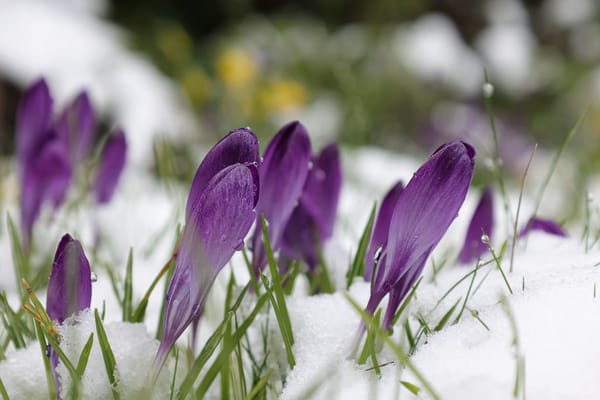writing as a practice

This has been a week of incredible epiphanies, and in my excitement to capture the essence of all of them at once in this single post, I'm quite unable to decide where to start. Chronology is as good a solution as any other to this conundrum.
It all began when I published my poem A Snow Avatar on my personal Facebook page and a long-time, very dear blogger friend of mine, Padmaja, (whom I haven't met in person although I've 'known' her for more than a decade now) said she wasn't a fan of 'growth'.
You need to have read the poem to understand her comment. For some context, the poem is about me wanting to become not a star but snow when I die, if such a thing were even possible, and ends with snow-me melting into water-me under the spring sun and slinking into the earth to herald the arrival of spring. I had ended the poem with these lines.
proudly will i stand
until the spring sun thaws me
into a shapeless mound
and melts me
so i can slink through the earth
and whisper to the roots and the seeds
waiting for my call
wake up
now is the time to grow
Padmaja commented, "Personally, there is so much joy in not growing..." I asked her whether she meant 'growth' as being opposed to 'simply being'. And she replied in the affirmative.
I understood what she meant. Her comment led me down a very enlightening trail of thought. It occurred to me that the term 'growth' is now laden with heavily negative connotations. Corporate growth, economic growth, career growth. Everything that sounds forced and manipulated, a means to an end.
So this is what I wrote in reply.
We can look at trees and marvel how they simply 'are'. And then we can look at a seed and see how it still 'is' but also 'grows' into a tree. So maybe 'growing' and 'being' are not necessarily opposite to each other. By simply 'being' in all new experiences, through all new moments, we 'grow' naturally into all-embracing souls. So maybe we don't have to 'grow', we can simply 'be', and the 'growing' part happens by itself.
And Padmaja added the following.
And by simply being, we do not bother about growth as well.
And we both decided, that 'bloom' was a better alternative to 'grow' to end the poem with. Nothing forced or unnatural about this word. Plus, as Padmaja pointed out, there is an element of innocence in the word 'bloom'.
wake up
now is the time to bloom
It was delightful to have this online conversation with Padmaja without fear of judgement or being misunderstood, and I do think replacing 'grow' with 'bloom' has imparted a new grace to the poem.
The practice of Yoga
The following morning, I woke up and rolled out my mat for my Yoga practice. I used to attend a weekly class every Wednesday evening, which came to a halt because of the lockdown. But that prompted me to begin a daily morning practice, which I have been able to keep up with, now that KrA is at home and can look after D while I'm on the mat.
On the first day, I started with five rounds of 'Suryanamaskara A' and five rounds of 'Suryanamaskara B', and decided to add a few more with each passing day. With this gradual progression, I think one day I was able to do 50 rounds or so. But after that I decided that is not what I wanted to do. I really only want to get to the mat, do the 5 + 5 rounds at a minimum, and then another 10 rounds or other postures, so that I'd have a good 20-30 minutes of practice.
So, the day after that discussion on 'grow' vs 'bloom', I checked my weight, for no real reason at all, and perhaps only for the second time in these past couple of months of lockdown. I had lost a total of seven kg.
I was astounded!
I had started my Yoga practice with the intention of becoming more present and more calm. Weight loss was not really an objective at this point. In fact, a knee injury was what led me to yoga in the first place as I could no longer run, and I didn't think a minimum of 10 Suryanamaskaras in a day would help me shed any weight. In fact, on several occasions, I'd just roll out the mat and stand, breathing in and out, do no more than two or three rounds, and decide to call it quits. My Yoga teacher always says, "You can do more yoga without moving than by twisting yourself into a pretzel."
So imagine my surprise when the scales showed me something so unexpected, something that was not even on my radar, and something that was only a natural outcome of 'being' in the state of Yoga.
Given my conversation with Padmaja just the previous day, I made the connection.
My 'being' in the state of Yoga regularly is helping me 'grow' healthy.
The practice of meditation
I have had a similar epiphany with respect to my meditation practice. I've had a start-stop relationship with meditation for years, and it wasn't until my Yoga teacher recommended a meditation practice that I went back to it with more intention this time. Dr. Shefali, my spiritual parenting guru, has also been conducting daily live meditation sessions on FaceBook.
I don't have a story to spin around meditation because I can't recall my first session or exactly how I progressed. But slowly, over time, I've been able to sit for longer, more and more effortlessly, coming back to the breath, pausing before every new breath coming in or going out. Sometimes I'd feel as if I've only managed a very short session and I'd open my eyes and see 20 minutes have passed.
I'm now in a place where I simply cannot end my day without my meditation practice. I always do it last thing at night. Actually, a little earlier because I don't want to fall asleep while meditating. I read after that to sleep. (My Yoga teacher recommends we meditate first thing in the morning and in the evening, before dinner. Those timings do not work for me right now, and I'm just glad to have managed to find some time to pursue it.)
As with Yoga, I went into meditation without any quantifiable objective, without any goal to attain at the 'end' of it. I meditate for the sake of meditation. Everything else, the falling into the no-mind space, the blooming consciousness, the yearning to go deeper within for that connection with Being-ness, that presence, are all turning out to be unintended outcomes of this practice.
My 'being' in the state of meditation is helping me 'grow' in presence.
The parenting practice
What is parenting, if not a spiritual practice?
It is a call to show up everyday, anew, without the emotional baggage of the past, with wisdom and presence, with compassion and detachment. A call to align ourselves so well that we can become truly capable of holding space for another, of giving them room to blossom into whoever they are meant to be.
Is there a goal to be achieved here? The SMART acronym, which stands for Specific, Measurable, Attainable/Achievable, Relevant, and Time-Bound, is thrown about a lot in management circles but can it ever truly apply to one of the most important roles most of us fulfil in life?
All we can do is show up authentically and know there are no guaranteed outcomes. There is nothing in our control except our presence, our being, the divinity we bring to our experience, while allowing the other to grow within the realm of their own experience.
Oh, D! I love you so much.
All these words sound so beautiful, but in reality it is so hard yet so easy, so fulfilling yet so terrifying, so wonderful and magical to look after a child. The only things that make it hard are the ones that keep us away from our true selves - fear, the desire to control, the inability to surrender and let the other's destiny and our own unfold the way they are meant to.
Every day we are called to wake up with a renewed sense of wonder, so we can sit back and simply be and let the other be too.
My 'being' with my child, authentically, in presence, simply 'being' and letting him 'be', is helping me 'grow' into a more conscious parent each day.
The writing practice?
So if the many important things in my life are 'practices' rather than 'goals', I've come to wonder if I should approach writing the same way too.
I've been working on a novel since January 2019. I outlined several chapters that month, then paused work on the novel for the rest of the year. I started writing it a few months ago, and even though I'm 40,000 words in as of now, it's really been a start-stop endeavour. I've tried setting daily word count goals, weekly word count goals, deadlines, and I follow them for about a week or so, and that's it. Another hiatus for several days before I try to come up with some other schedule that might work, some other goal that at least appears SMART.
I must mention here that I also have a freelance academic editing gig, which pays some of the bills for now. So juggling editing for short-term monetary returns and writing for creative fulfilment and the potential for it to turn into a long-term career has been really hard. I've struggled to find and maintain a balance.
I think I've been aiming too high. Earlier this month, I opted to write 1,000 words a day, and I did manage to write about 5,425 words over five days. But I haven't written anything on the novel since May 5. So it's as good as having written 5,425 words over 17 days, which amounts to about 320 words per day.
So now, I plan to write 250 words a day.
Yes.
250 words a day. That is my humble goal.
I had contemplated this goal earlier but always pooh-poohed it as being too low. But this is better than nothing, and, as proved above, is actually equivalent to having a few high-word-count days followed by several non-writing days. It is a mentally, physically and emotionally exhausting endeavour to write, just like any other job. And the solitary nature of this occupation only makes it harder. There's no one to bitch to when I've written myself into a corner. Just kidding! :D
But I love writing. I love words. I love falling into plot traps. And I love it even more when a brilliant solution presents itself to me, and the story proceeds of its own accord.
And I've noticed one other thing. For the five days I aimed to write 1,000 words a day, I wrote a little more than 1,000 words. And it added up to a nearly 10% bonus! And so I reason, if I aim for at least 250 words, chances are I'd write a little more than that, and each and every written word will add up in the long run.
So here's a promise. From tomorrow, Sunday, May 17, 2020, I will pen at least 250 words on my novel before getting to my editing work. That sounds doable. In fact, I am pretty excited about it. I edit almost every day, plus it has external deadlines and I do go the extra mile to meet those. So if I can squeeze in the 250 words of writing before starting my editing work, it could indeed become a daily practice.
And, as with every other practice, I intend to go in without fear or judgement. I intend to write for the pure joy of creativity, of relishing the beauty of words. The novel, the poems, Tales for D, the hopefully many, many books - all those will be pleasant additional outcomes, not the intended goals.
I intend to approach my writing with presence and being-ness. It's not the doing, but the being. I don't plan to write the story. I intend to become the story itself.
I hope that my 'being' in the practice of writing will help me 'grow' in creativity.
I am supremely excited now at this prospect. Let us see how it all unfolds.
I think the image at the beginning of this post captures the essence of 'practice'. It is the prospect of light at the end of the tunnel that keeps us going. The journey is over once we are out of the tunnel and into the light, which, to me, symbolises the end. We all get to the end eventually, whether we will it or not, whether we do anything or not during the journey. How to maintain a consistent writing habit/practice along the way is what I'm hoping to figure out.
Attribute: Photo by Patrick Fore on Unsplash




